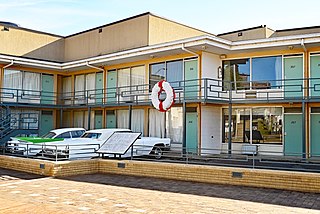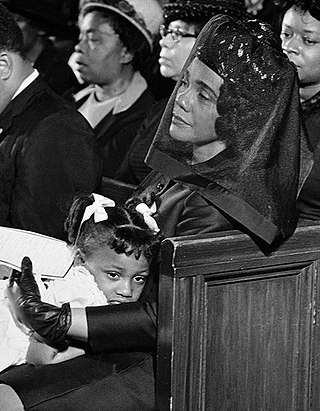Related Research Articles

Martin Luther King Jr. was an American Baptist minister, activist, and political philosopher who was one of the most prominent leaders in the civil rights movement from 1955 until his assassination in 1968. A Black church leader and a son of early civil rights activist and minister Martin Luther King Sr., King advanced civil rights for people of color in the United States through the use of nonviolent resistance and nonviolent civil disobedience against Jim Crow laws and other forms of discrimination in the United States.

Ralph David Abernathy Sr. was an American civil rights activist and Baptist minister. He was ordained in the Baptist tradition in 1948. As a leader of the civil rights movement, he was a close friend and mentor of Martin Luther King Jr. He collaborated with King and E. D. Nixon to create the Montgomery Improvement Association, which led to the Montgomery bus boycott and co-created and was an executive board member of the Southern Christian Leadership Conference (SCLC). He became president of the SCLC following the assassination of King in 1968; he led the Poor People's Campaign in Washington, D.C., as well as other marches and demonstrations for disenfranchised Americans. He also served as an advisory committee member of the Congress on Racial Equality (CORE).

Asa Philip Randolph was an American labor unionist and civil rights activist. In 1925, he organized and led the Brotherhood of Sleeping Car Porters, the first successful African-American-led labor union. In the early Civil Rights Movement and the Labor Movement, Randolph was a prominent voice. His continuous agitation with the support of fellow labor rights activists against racist labor practices helped lead President Franklin D. Roosevelt to issue Executive Order 8802 in 1941, banning discrimination in the defense industries during World War II. The group then successfully maintained pressure, so that President Harry S. Truman proposed a new Civil Rights Act and issued Executive Orders 9980 and 9981 in 1948, promoting fair employment and anti-discrimination policies in federal government hiring, and ending racial segregation in the armed services.

James Morris Lawson Jr. is an American activist and university professor. He was a leading theoretician and tactician of nonviolence within the Civil Rights Movement. During the 1960s, he served as a mentor to the Nashville Student Movement and the Student Nonviolent Coordinating Committee. He was expelled from Vanderbilt University for his civil rights activism in 1960, and later served as a pastor in Los Angeles for 25 years.

Coretta Scott King was an American author, activist, and civil rights leader and the wife of Martin Luther King Jr. from 1953 until his death. As an advocate for African-American equality, she was a leader for the civil rights movement in the 1960s. King was also a singer who often incorporated music into her civil rights work. King met her husband while attending graduate school in Boston. They both became increasingly active in the American civil rights movement.
Jerome Wurf was a U.S. labor leader and president of the American Federation of State, County and Municipal Employees (AFSCME) from 1964 to 1981. Wurf was a friend of Martin Luther King Jr., and was arrested multiple times for his activism, notably during the Memphis sanitation strike. He was present for King's "I've Been to the Mountaintop" oratory at the strike, the day before King was assassinated, and attended King's funeral.

The Martin Luther King Jr. National Historical Park covers about 35 acres (0.14 km2) and includes several sites in Atlanta, Georgia related to the life and work of civil rights leader Martin Luther King Jr. Within the park is his boyhood home, and Ebenezer Baptist Church — the church where King was baptized and both he and his father, Martin Luther King Sr., were pastors — as well as, the grave site of King, Jr., and his wife, civil rights activist Coretta Scott King.

Martin Luther King III is an American human rights activist, philanthropist and advocate. The oldest son of civil rights leaders Martin Luther King Jr. and Coretta Scott King, King served as the 4th President of the Southern Christian Leadership Conference from 1997 to 2004.

The Martin Luther King, Jr. Memorial is a national memorial located in West Potomac Park next to the National Mall in Washington, D.C., United States. It covers four acres (1.6 ha) and includes the Stone of Hope, a granite statue of Civil Rights Movement leader Martin Luther King Jr. carved by sculptor Lei Yixin. The inspiration for the memorial design is a line from King's "I Have a Dream" speech: "Out of the mountain of despair, a stone of hope." The memorial opened to the public on August 22, 2011, after more than two decades of planning, fund-raising, and construction.
Jack O'Dell was an African-American activist writer and communist, best known for his role in the civil rights movement of the 1950s and 1960s. During World War II, he was an organizer for the National Maritime Union. He was also involved with the Communist Party USA (CPUSA) and the Southern Christian Leadership Conference (SCLC) as well as working with Martin Luther King Jr.
David Jeffries Garrow is an American author and historian. He wrote the book Bearing the Cross: Martin Luther King, Jr., and the Southern Christian Leadership Conference (1986), which won the 1987 Pulitzer Prize for Biography. He also wrote Liberty and Sexuality (1994), a history of the legal struggles over abortion and reproductive rights in the U.S. prior to the 1973 Roe v. Wade decision, Rising Star: The Making of Barack Obama (2017), and other works.

Clayborne Carson is an American academic who is a professor of history at Stanford University and director of the Martin Luther King, Jr., Research and Education Institute. Since 1985, he has directed the Martin Luther King Papers Project, a long-term project to edit and publish the papers of Martin Luther King Jr.
Henry Loeb III was an American politician of the Democratic Party, who was mayor of Memphis, Tennessee, for two separate terms in the 1960s, from 1960 through 1963, and 1968 through 1971. He gained national notoriety in his second term for his role in opposing the demands of striking sanitation workers in early 1968. A segregationist, he opposed civil rights for African Americans and promoted white supremacy, continuing former Memphis mayor and political boss E. H. Crump's legacy.

The Memphis sanitation strike began on February 12, 1968, in response to the deaths of sanitation workers Echol Cole and Robert Walker. The deaths served as a breaking point for more than 1,300 African American men from the Memphis Department of Public Works as they demanded higher wages, time and a half overtime, dues check-off, safety measures, and pay for the rainy days when they were told to go home.

Martin Luther King Jr., an African-American clergyman and civil rights leader, was fatally shot at the Lorraine Motel in Memphis, Tennessee, on April 4, 1968, at 6:01 p.m. CST. He was rushed to St. Joseph's Hospital, where he died at 7:05 p.m. He was a prominent leader of the civil rights movement and a Nobel Peace Prize laureate who was known for his use of nonviolence and civil disobedience.
Robert F. Kennedy Human Rights is an American 501(c)(3) nonprofit human rights advocacy organization. It was named after United States Senator Robert F. Kennedy in 1968, a few months after his assassination. The organization of leading attorneys, advocates, entrepreneurs and writers is dedicated to a more just and peaceful world, working alongside local activists to ensure lasting positive change in governments and corporations. It also promotes human rights advocacy through its RFK Human Rights Award, and supports investigative journalists and authors through the RFK Book and Journalism Awards. It is based in New York and Washington, D.C.

The first memorial service following the assassination of Martin Luther King Jr. on April 4, 1968, took place the following day at the R.S. Lewis Funeral Home in Memphis, Tennessee. This was followed by two funeral services on April 9, 1968, in Atlanta, Georgia, the first held for family and close friends at Ebenezer Baptist Church, where King and his father had both served as senior pastors, followed by a three-mile procession to Morehouse College, King's alma mater, for a public service.
The history of the 1954 to 1968 American civil rights movement has been depicted and documented in film, song, theater, television, and the visual arts. These presentations add to and maintain cultural awareness and understanding of the goals, tactics, and accomplishments of the people who organized and participated in this nonviolent movement.

William Lucy is an American trade union leader. He served as Secretary-Treasurer of the American Federation of State, County and Municipal Employees (AFSCME) from 1972–2010.
References
- ↑ (SNAC) Social Networks and Archival Context (2013). "Honey, Michael". Institute for Advanced Technology in the Humanities / University of Virginia . Retrieved 10 June 2015.
- ↑ "Michael Honey". The King Legacy. Retrieved 2011-04-15.
- 1 2 3 "Michael K. Honey, Ph.D." University of Washington Tacoma . Retrieved 2011-04-15.
- ↑ "UWT professor among Guggenheim Fellows". Tacoma News Tribune. 2011-04-09. Archived from the original on 2012-09-08. Retrieved 2011-04-15.
- ↑ "UW Tacoma professor earns Guggenheim award". Tacoma Daily Index. 2011-04-13. Archived from the original on 2011-08-10. Retrieved 2011-04-15.
- ↑ "Liberty Legacy Foundation Award Winners". Liberty Legacy Foundation Award. Archived from the original on 2011-01-07. Retrieved 2011-04-15.
- ↑ Robert F. Kennedy Center for Justice & Human Rights / Robert F. Kennedy Foundation of Europe (2015). "Book Award". Archived from the original on 19 June 2015. Retrieved 10 June 2015.
- ↑ "Guggenheim award supports study of Depression-era songwriter". University of Washington Tacoma. 2011-04-13. Retrieved 2011-04-15.